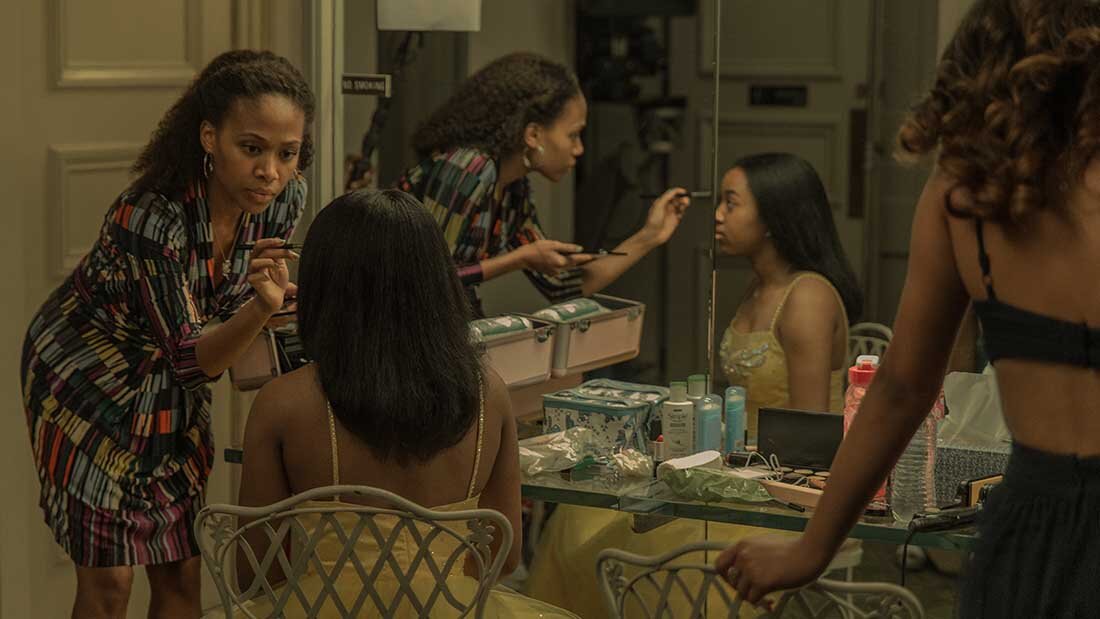Sundance Institute
By Andrea Thompson
A mother in a small Southern town who pushes her daughter to compete in the same beauty pageant she won? This is the kind of scenario that just seems tailor-made for one stereotype after another, from the kind of demeaning, stereotypical has-been so desperate for her glory days she decides to sculpt her rebellious teenage daughter into the same mold she once filled so well, despite her daughter's clear objections.
But writer-director Channing Godfrey Peoples would rather laugh at such tawdry plans – in her feature debut no less – and give us a touching love story between a mother and daughter which also doubles as a kind of coming-of-age for both. The fact that we're introduced to mother Turquoise Jones (Nicole Beharie) first is indicative of Peoples's determination to give her characters their due, rather than devolving into more pernicious stereotypes. Even if their behavior sometimes conforms to them, People's clear-eyed compassion makes all the difference.
That empathy is primarily what makes it so hard to blame Turquoise for being nostalgic. Who wouldn't, given her past glory and pride as the winner of the Miss Juneteenth pageant, especially when her current job at a local restaurant, which she runs in everything but name (well, and title and salary) routinely involves cleaning toilets? Not that she has much time to feel sorry for herself, given that she's a single mother to the 15-year-old Kai (Alexis Chikaeze), who is beginning to envision a path for herself that's quite different from the one her mother has set for her?
Thankfully, Turquoise and Kai's differences never obscure the very real bond they have, which isn't only the movie's heart, but its backbone. Turquoise is never in denial about her daughter's reluctance to be a beauty queen, but while her nostalgia is always a factor, it's never her primary motivation, which is always a better life for Kai. For Turquoise, the pageant is the best way to provide that in a small town where resources and opportunities are scarce enough, but especially so for black women. From the name of the pageant, which is itself an ode to the day slavery was abolished, to the other characters, the majority of whom are also black, race isn't just a topic to be explored, but a force that shapes their lives and decisions.
Gender is also given equal weight. The Juneteenth pageant embodies prestige and history, but there's an actual tangible benefit to being a beauty queen. As in a full scholarship to any black university of the winner's choice...provided they follow the rules, since the organizers make it clear that the winner will represent not just history, but the ideal woman. As such, the contestants are expected to adhere to a strict, very gendered code of conduct in how they dress and conduct themselves, with very real consequences if they violate them. Turquoise knows this firsthand, given her pregnancy resulted in her disqualification from taking the traditional walk, crowning the next reigning queen, and her scholarship. Small wonder Kai finds such expectations restricting, dreaming instead of joining the school's dance squad, which the more conservative Turquoise frowns upon.
Sundance Institute
Think that division is going to translate into one of the film's most touching moments? Well, you're right, but it also brings words like irresistible, empowering, and inspiring to mind. Kai doesn't just discover a middle ground between her mother's interests and her own, she gives her own spin on both her pageant performance of Maya Angelou's “Phenomenal Woman” and her femininity, with a look that involves her natural hair. It's nicely complementary to Turquoise's cemented status as a non-traditional community leader, through her work at the bar, where's she very much respected, and her bond with many of the other town's residents, not to mention her two love interests. The emphasis, however, is always on Turquoise's own longing to create something of her own, which she manages to in her own non-traditional fashion.
In essence, “Miss Juneteenth” is an ode to black mothers in all their imperfect glory, with Turquoise often acting as a leader and mother to her community, even her own mother, a judgmental, alcoholic minister she's estranged from. Turquoise sacrifices for her child while being constantly reminded of the many ways she's seen as a failure, even making a party out of developments such as the lights being shut off. Survival and hope shine through above all.



